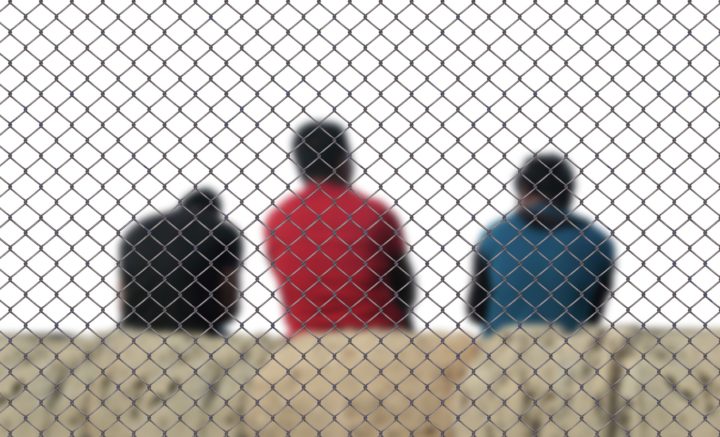Covid-19 makes it clear that our fates are intertwined
As our public health infrastructure buckles under the pressure of Covid-19, billions of federal dollars are flowing to the Department of Homeland Security for civil immigration enforcement. Immigration and Customs Enforcement and Customs and Border Protection—which together command more of the Homeland Security budget than the Federal Emergency Management Agency—are draining public coffers to keep a deportation machine running during a pandemic.
If there were ever a time to question the “homeland security” justification for this machinery, it is now. At the same time that hospitals are scrambling to secure protective equipment, ICE has made a bid for 45,000 N95 masks. As the death toll in America’s jails and prisons mounts, ICE has rejected calls by Homeland Security’s own whistle-blower doctors to release the vast majority of the 35,000 people in civil immigration custody. Not to be outdone, CBP has begun turning away children seeking humanitarian protection at the border, forcing them to fend for themselves in crowded and unsanitary encampments. Deportations have continued, even as those deported have tested positive for the virus. ICE and CBP have put their officers at risk, as growing numbers of their personnel have tested positive alongside the people they target for deportation.
Asked to defend their actions, these agencies have responded predictably. In the blunt words of Acting Deputy Secretary of Department of Homeland Security Ken Cuccinelli, the government must “continue to prioritize arresting and removing criminal aliens and other aliens who pose a threat to public safety, just as it always has during President Trump’s administration.” People’s lives be damned.
Even in a public health crisis, ICE and CBP are determined to divide the public into citizen and noncitizen, good and bad. The rhetoric of these agencies is intentional. The very term “criminal alien”—which ICE and CBP use to refer to anyone who has had contact with the criminal legal system and who is not yet a US citizen—is designed to provoke fear and justify civil immigration enforcement.
Who are these so-called threats to public safety? The majority, according to homeland security statistics, are people of color living in the United States who have immigration, drug, or traffic offenses on their records. They include fathers and mothers, refugees fleeing trauma, community leaders, US military veterans, and others who consider America their only home.
Their records are not a reflection of some causal connection between immigration status and crime. People who are foreign-born are less likely to commit crimes than those born in the United States. And when people who happen to be immigrants are convicted of crimes, they serve their time and seek a second chance like everyone else. But because of where they were born, deportation becomes a double punishment.
They face these harsh consequences as an extension of another epidemic in this country: Our reliance on the tools of mass incarceration to address social problems. As many as one in three adults in America have had contact with the criminal legal system, with the effects felt disproportionately by people of color. For immigrants, these effects include deportation. They become the justification for a growing deportation machine.
The Trump administration is not the first administration to use “criminal aliens” as the bogeymen to justify its policies. President Barack Obama infamously framed his immigration policy as one that targets “felons, not families”—leading to a record-breaking 3 million deportations. The Obama administration expanded Secure Communities nationwide, a Bush-era pilot project that turns any fingerprintable arrest into a potential deportation case. And the Trump, Obama, and Bush administrations were all enforcing harsh deportation laws enacted under the Clinton administration in 1996—laws that vastly expanded the criminal grounds for deportation.
Times of crisis invite fearmongering. “I urge the strengthening of our deportation laws so as to more fully rid ourselves of criminal aliens,” President Herbert Hoover declared in his 1930 State of the Union address, as the country fell into the Great Depression. Immigrants are always easy targets for political oppression—and painting them as uniquely criminal only makes matters worse. Senator Joe Biden, now the presumptive 2020 Democratic Party presidential nominee, must break from this cycle to create a more inclusive immigration policy—one that doesn’t rely on a racially charged criminal legal system to determine who belongs in America.
Studies confirm that deportation does not reduce crime or promote public safety. Instead, deportation—and the imprisonment of immigrants pending their deportation—causes harm: family separation, economic loss, depression and anxiety, and even death. Long before this pandemic, the machinery of deportation created a public health crisis.
Covid-19 should lead people to reassess what safety and security look like in a world where our fates are intertwined. We have the opportunity to pursue a vision that values the lives of the entire public. To do that, we must reject policies that carve up immigrant communities into deserving and undeserving, and reinvest these resources for public good. And in the meantime, we should take a page from the medical professionals at our front lines: do no harm. Now is not the time to imprison and deport. Now is the time to protect and heal.
————————-
EDITOR’S NOTE: The Nation believes that helping readers stay informed about the impact of the coronavirus crisis is a form of public service. For that reason, this article, and all of our coronavirus coverage, is now free. Please subscribe to support our writers and staff, and stay healthy.
———————-
*Alina Das is a professor at New York University School of Law and author of No Justice in the Shadows: How America Criminalizes Immigrants.






